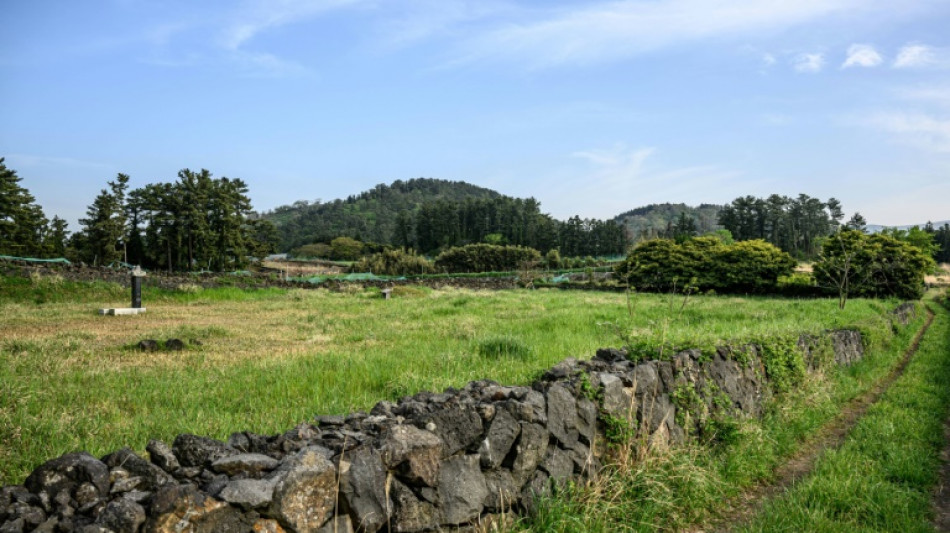
-
 Wales revel in being the underdogs, says skipper Lake
Wales revel in being the underdogs, says skipper Lake
-
German school students rally against army recruitment drive

-
 Wary European states pledge military aid for Cyprus, Gulf
Wary European states pledge military aid for Cyprus, Gulf
-
Liverpool injuries frustrating Slot in tough season

-
 Real Madrid will 'keep fighting' in title race, vows Arbeloa
Real Madrid will 'keep fighting' in title race, vows Arbeloa
-
Australia join South Korea in quarters of Women's Asian Cup

-
 Kane to miss Bayern game against Gladbach with calf knock
Kane to miss Bayern game against Gladbach with calf knock
-
Henman says Raducanu needs more physicality to rise up rankings

-
 France recall fit-again Jalibert to face Scotland
France recall fit-again Jalibert to face Scotland
-
Harry Styles fans head in one direction: to star's home village

-
 Syrian jailed over stabbing at Berlin Holocaust memorial
Syrian jailed over stabbing at Berlin Holocaust memorial
-
Second Iranian ship heading to Sri Lanka after submarine attack

-
 Middle East war spirals as Iran hits Kurds in Iraq
Middle East war spirals as Iran hits Kurds in Iraq
-
Norris hungrier than ever to defend Formula One world title

-
 Fatherhood, sleep, T20 World Cup final: Henry's whirlwind journey
Fatherhood, sleep, T20 World Cup final: Henry's whirlwind journey
-
Conservative Nigerian city sees women drive rickshaw taxis

-
 T20 World Cup hero Allen says New Zealand confidence high for final
T20 World Cup hero Allen says New Zealand confidence high for final
-
The silent struggle of an anti-war woman in Russia

-
 Iran hits Kurdish groups in Iraq as conflict widens
Iran hits Kurdish groups in Iraq as conflict widens
-
China sets lowest growth target in decades as consumption lags

-
 Afghans rally against Pakistan and civilian casualties
Afghans rally against Pakistan and civilian casualties
-
South Korea beat Philippines 3-0 to reach women's quarter-finals

-
 Mercedes' Russell not fazed by being tipped as pre-season favourite
Mercedes' Russell not fazed by being tipped as pre-season favourite
-
Australia beat Taiwan in World Baseball Classic opener

-
 Underdogs Wales could hurt Irish after Scotland display: Popham
Underdogs Wales could hurt Irish after Scotland display: Popham
-
Gilgeous-Alexander rules over Knicks again in Thunder win

-
 Hamilton reveals sequel in the works to blockbuster 'F1: The Movie'
Hamilton reveals sequel in the works to blockbuster 'F1: The Movie'
-
Alonso, Stroll fear 'permanent nerve damage' from vibrating Aston Martin

-
 China boosts military spending with eyes on US, Taiwan
China boosts military spending with eyes on US, Taiwan
-
Seoul leads rebound across Asian stocks, oil extends gains

-
 Tourism on hold as Middle East war casts uncertainty
Tourism on hold as Middle East war casts uncertainty
-
Bayern and Kane gambling with house money as Gladbach come to town

-
 Turkey invests in foreign legion to deliver LA Olympics gold
Turkey invests in foreign legion to deliver LA Olympics gold
-
Galthie's France blessed with unprecedented talent: Saint-Andre

-
 Voice coach to the stars says Aussie actors nail tricky accents
Voice coach to the stars says Aussie actors nail tricky accents
-
Rahm rejection of DP World Tour deal 'a shame' - McIlroy

-
 Israel keeps up Lebanon strikes as ground forces advance
Israel keeps up Lebanon strikes as ground forces advance
-
China prioritises energy and diplomacy over Iran support

-
 Canada PM Carney says can't rule out military participation in Iran war
Canada PM Carney says can't rule out military participation in Iran war
-
Verstappen says new Red Bull car gave him 'goosebumps'

-
 Swiss to vote on creating giant 'climate fund'
Swiss to vote on creating giant 'climate fund'
-
Google to open German centre for 'AI development'

-
 Winter Paralympics to start with icy blast as Ukraine lead ceremony boycott
Winter Paralympics to start with icy blast as Ukraine lead ceremony boycott
-
Sci-fi without AI: Oscar nominated 'Arco' director prefers human touch

-
 Ex-guerrillas battle low support in Colombia election
Ex-guerrillas battle low support in Colombia election
-
'She's coming back': Djokovic predicts Serena return

-
 Hamilton vows 'no holding back' in his 20th Formula One season
Hamilton vows 'no holding back' in his 20th Formula One season
-
Two-thirds of Cuba, including Havana, hit by blackout

-
 US sinks Iranian warship off Sri Lanka as war spreads
US sinks Iranian warship off Sri Lanka as war spreads
-
U.S. Polo Assn. Expands Collegiate Partnership Program to Record 70 Teams for 2026 Season


Graveyard sheds light on Kim Jong Un's South Korean heritage
North Korea's leader Kim Jong Un has threatened Seoul with fiery destruction, but as a remote graveyard on a resort island shows, he has closer links to the South than he might like to admit.
At a cemetery in a hard-to-find corner of South Korea's Jeju island, there are 13 tombstones bearing the Ko family name -- Kim's relatives through his mother, Ko Yong Hui.
Jong Un is the third member of the Kim family to rule North Korea, following in the footsteps of his father and grandfather -- what official hagiography calls the "Paektu bloodline".
But the Jeju graves tell a wider story.
Kim's mother was born in Osaka in 1952 to a native Jeju islander who emigrated to Japan in 1929, when the Korean peninsula was under Tokyo's colonial rule.
Many of her family, including Kim's maternal great-grandfather, are buried on Jeju, their overgrown graves a stark contrast to Pyongyang's Kumsusan Palace of the Sun, where the embalmed bodies of Kim's father and grandfather Kim Il Sung lie in state.
After Kim came to power in 2011 following the death of his father Kim Jong Il, many experts highlighted his mother's South Korean and Japanese heritage. Pyongyang has never confirmed it.
The regime "must have feared confirmation would undermine its legitimacy", Cheong Seong-chang of the Center for North Korea Studies at the Sejong Institute, told AFP.
The Kim dynasty bases its claim to power on Kim Il Sung's role as a guerrilla fighter driving out Japan and winning Korea its independence in 1945.
"Korea-Japan heritage runs directly counter to the North Korean myth of its leadership," Cheong said.
- Kim's mother -
Kim's mother grew up in the Japanese port city of Osaka, but her family moved to North Korea in the 1960s as part of a decades-long repatriation programme by Pyongyang.
The scheme urged ethnic Koreans living in Japan to move to North Korea, part of a drive to "claim supremacy" over the South, said Park Chul-hyun, a novelist and columnist in Tokyo.
"The North saw the Korean-Japanese community as a strategic battleground," he said, and managed to convince nearly 100,000 ethnic Koreans to relocate to the "socialist paradise".
The Ko family answered the call, and lived a relatively normal life in the North until their eldest daughter caught the eye of the country's heir apparent.
Experts believe that Ko, who was a performer with the Mansudae Art Troupe of musicians and dancers, first met Kim Jong Il in Pyongyang in 1972.
She would become his partner in 1975, experts say, and although there is no official record of their marriage the pair had three children. She died in 2004.
"There has been nothing about Ko Yong Hui in official state media," said Rachel Minyoung Lee, a non-resident fellow with the 38 North Program at the Washington-based Stimson Center.
There is not much in state media about Kim Jong Un's background and heritage generally beyond attempts to show he is the legitimate heir to the Mount Paektu legacy, she added.
– Empty grave -
South Korean media discovered the Ko family graves on Jeju in 2014 -- one of the first real confirmations of Kim Jong Un's South Korean ancestry.
At that time, there was a plaque -- known as an "empty grave" in the South -- honouring Kim's maternal grandfather Ko Gyong Taek, even though he died and was buried in the North.
"Born in 1913 and moved to Japan in 1929. He passed away in 1999," read the plaque, a custom which allows family members to perform ancestor rites even if the body is not present.
The plaque was not there when AFP visited the Jeju graveyard in April 2022.
It had been removed by a distant relative of Kim Jong Un, who was shocked by the media attention and feared the grave would be vandalised, the daily Chosun Ilbo reported.
He said his family "knew nothing about the relation to Kim Jong Un", prior to the media discovery, the report said.
M.Ouellet--BTB


